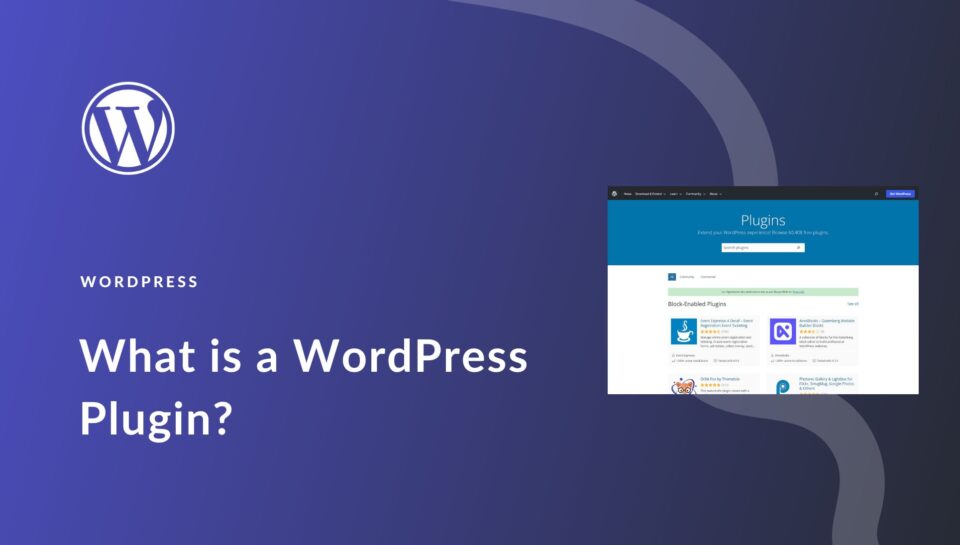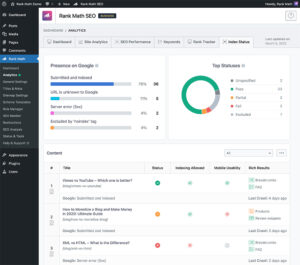
Top 5 Must-Have WordPress Plugins 2025: Developer’s Guide
Introduction.
Did you know that the average WordPress site uses 20-30 plugins, but developers agree that less than 25% of those actually provide meaningful value? As a WordPress developer myself, I’ve spent countless hours testing and implementing various plugins across hundreds of sites. Let’s cut through the noise and focus on the absolute game-changers that will revolutionize your WordPress development process in 2025! WordPress plugins
WordPress plugins are powerful software extensions that enhance website functionality, allowing users to add features and customize their sites without coding expertise.
My Top Five plugins in 2025.
- Elementor plugin
- Rank math SEO plugin
- Google site kit
- Autoptimize
- Wp Mail SMTP
The aforementioned plugins are my top five plugins in any site apart from the core plugins that may vary with different themes and templates.
Honorable mentions include;
- Wp Fastest cache
- Whatsapp plugin
- Slider Revolution
- Wp Code lite
- Woo commerce for e-commerce sites
I will now dive into detail in the functionality of my top five plugins that every developer needs to know about. WordPress plugins
Role of Plugins in Modern WordPress Development.
Let me tell you something funny – I once crashed an entire e-commerce site by activating too many plugins at once. Yeah, not my proudest moment! But hey, we all learn from our mistakes, right? After spending over five years in WordPress development, I’ve realized that plugins are kind of like spices in cooking – you need the right ones in the right amount, or you’ll end up with a mess.
I remember when I first started developing WordPress sites back in the day. Man, I used to install every plugin that looked even remotely useful! My sites were like those overcrowded closets where you can barely close the door. Trust me, I learned the hard way that more plugins don’t equal better functionality.
Here’s the thing about WordPress plugins that nobody tells you upfront: they’re not just add-ons, they’re more like building blocks of your site’s DNA. When you’re working with WordPress core functionality, you’ve got two choices – either write custom code (which, let’s be honest, can be a real pain sometimes) or use plugins. And let me tell you, there’s no shame in using plugins when they make sense!
One of my biggest breakthrough moments came when I started treating plugins as tools rather than solutions. It’s like the difference between buying a pre-made meal and having ingredients in your kitchen. Sometimes you need that quick fix, but other times you’re better off cooking from scratch. I’ve found that the sweet spot usually lies somewhere in between.
Security-wise, plugins can be your best friend or your worst nightmare. I once inherited a site that had been hacked through an outdated plugin – what a mess that was to clean up! Since then, I’ve become almost obsessive about plugin security. Pro tip: always, and I mean ALWAYS, check the last update date and the number of active installations before adding any plugin to your site.
The real game-changer for me was learning to evaluate plugins based on their impact on site performance. You’d be surprised how many “lightweight” plugins actually add significant overhead to your site.
Performance Optimization Plugins.
This is where Autooptimize and Wp fastest cache come in.
Let’s talk about performance – my absolute favorite topic! I used to think I could get away with basic optimization, until one of my sites hit the front page of search engines . Talk about a baptism by fire! That experience taught me more about caching and optimization than any course ever could. Honestly, we all hate slow sites. Slow network and sites have a way of getting under one’s skin.
Autooptimize changed my entire approach to caching. Before discovering it, I was manually relying on Inshaalahs and hope. But Autoptimise just makes everything so much more straightforward. This especially comes into play when you have a colorful site full of high quality images as they tend to drag your site. Autooptimise helps you cache your site data which keeps on building. By in-lining your CSS, optimizing your code and JSS one achieves faster loading times as the render time is significantly reduced.Wordpress plugins
Image optimization is another game-changer. I can’t tell you how many times I’ve inherited sites where someone uploaded 5MB images straight from their DSLR camera. Yikes! Now I use a combination of server-side and client-side optimization tools. My go-to setup includes both automatic optimization on upload and bulk optimization for existing media libraries. Ever heard the word Largest content-full paint( LCP). Through image optimization, we are also able to reduce the time the site gets to load the most content-full page on your site.
Database optimization is like spring cleaning for your WordPress site. Now I regularly clean up post revisions, transients, and orphaned metadata. It’s amazing how much faster a site can run with a clean database! Check how fast my site is optimized. WordPress plugins
Development Workflow Enhancement Plugins

This is where elementor comes in. Elementor is a page builder plugin that allows you to test responsiveness on both desktop and mobile while building. I once built a site that only looked good on desktop interphase but horrible on mobile. Did you know that 87% of search volume is generated from mobile searches? WordPress plugins
Elementor is literally the best money I’ve ever spent on a WordPress plugin. Period. I remember trying to build custom fields manually – what a nightmare that was! Now I can set up complex content structures in minutes instead of hours. It’s completely transformed how I build sites. WordPress plugins
Version control with WordPress used to be such a pain, but now we’ve got some amazing tools that make it almost enjoyable. I’ve set up automated deployment workflows that make pushing changes to staging and production environments as simple as clicking a button. Remember the days of FTPing files directly to production? shudders
Database migration used to be this scary process that I’d put off as long as possible. Now, with the right tools, it’s practically foolproof. I’ve got a whole system set up for syncing between local, staging, and production environments. The first time I successfully pushed a complex site from local to production without a hitch, I literally did a happy dance in my room!
Code snippet management is another area where the right plugins make all the difference. Instead of digging through functions.php files trying to find that one snippet I need, I’ve got everything organized and easily accessible. It’s like having a digital library of all your best code solutions right at your fingertips and all this is thanks to wpcode lite.
Remember to test each plugin thoroughly in a staging environment before deploying to production. I can’t stress this enough – I’ve learned this lesson the hard way more times than I’d like to admit! WordPress plugins
Search engine optimization WordPress plugins

The final boss of plugins is Search engine optimization and that is where rank math comes in.
Let me tell you a story about SEO that’ll make you laugh – or maybe cry. Back when I first started optimizing websites, I was basically throwing spaghetti at the wall and hoping something would stick. Keyword research? More like keyword guesswork! Then Rank Math came along and changed everything about how I approach search engine optimization. WordPress plugins
I remember the days of manually configuring every single SEO element on a website. It was like trying to solve a Rubik’s cube blindfolded – frustrating, time-consuming, and almost always ending in disappointment. Rank Math is basically the final boss of SEO plugins that I wish I’d discovered years ago. It’s so intuitive that sometimes I can’t believe how complicated I used to make things!Wordpress plugins
The first time I installed Rank Math, it was like someone turned on a light in a really dark room. The setup wizard is ridiculously straightforward – even my least tech-savvy clients can navigate it without pulling their hair out. You know how most SEO plugins make you feel like you need a computer science degree to use them? Rank Math is basically the opposite of that.
One of the coolest features – and I’m not gonna lie, this totally geeked me out – is the content analysis tool. It’s like having a super-smart editor sitting right next to you, giving real-time feedback on your content. I’ve caught so many optimization issues that I would’ve completely missed before. Remember those moments in school when you wished you had someone whispering the right answers? This is basically that, but for SEO.
The keyword optimization suggestions are next-level. I’m talking about deep, meaningful insights that go way beyond just stuffing keywords into your content. Rank Math actually understands context, which is huge. It’s not just counting how many times you’ve used a keyword, but analyzing how naturally it fits into your content. I’ve seen it catch subtle optimization opportunities that would’ve flown under the radar with other plugins.
Schema markup used to be this mysterious black art that only the most hardcore SEO nerds understood. With Rank Math, it’s suddenly as easy as clicking a few buttons. I’ve implemented complex schema configurations for clients that would’ve taken hours of manual coding, now done in minutes. The first time I saw one of my client’s sites get those rich snippets in search results, I might have done a little victory dance. WordPress plugins
The local SEO features are a game-changer for small businesses. I worked with a local shoe seller that was struggling to show up in local search results, and Rank Math completely transformed their online visibility. We’re talking about going from the third page of Google to the top of the local pack. The client was so excited, they gave me a pair of New Balance – which, let’s be honest, is the best form of payment! WordPress plugins
Performance tracking is another area where Rank Math absolutely shines. It integrates seamlessly with Google Search Console, giving you a comprehensive view of how your site is performing. I’ve spent countless hours digging through analytics, and Rank Math makes it feel almost effortless. The insights are so clear that even clients who aren’t tech-savvy can understand what’s happening with their website.
Let me drop a pro tip that took me way too long to learn: SEO isn’t just about keywords and technical configurations. It’s about creating genuinely valuable content that serves your audience. Rank Math helps you do that by providing real, actionable guidance. It’s not just about gaming the system – it’s about creating content that actually matters.
Google site kit WordPress plugin.

Now that I just talked about Rank math it is only prudent I finish with google site kit.
Oh boy, do I have stories about analytics platforms! Before Google Site Kit, tracking website performance was like trying to read a foreign language. Multiple dashboards, complicated integrations, data scattered everywhere – it was a nightmare that would make even the most patient developer want to throw their computer out the window.
Google Site Kit is basically the King of website analytics as it’s packed with powerful data insights. The first time I installed it, I felt like I’d been given x-ray vision for my websites. Suddenly, all those scattered analytics were consolidated into one clean, intuitive dashboard. No more jumping between Google Analytics, Search Console, AdSense, and a dozen other platforms! WordPress plugins
Integration is where Site Kit truly shines. Remember the old days of manually adding tracking codes, hoping you didn’t mess something up? Those days are gone. With Site Kit, it’s literally a one-click installation. I’ve set it up for clients who consider themselves “not tech-savvy,” and they’ve managed it without breaking a sweat. It’s so user-friendly that it almost feels like cheating.
Performance tracking used to be this complex art form that required specialized knowledge. Now, Site Kit breaks down your website’s performance in a way that’s actually human-readable. I’m talking about real, actionable insights that don’t require a PhD in data science to understand. The first time I showed a client their site’s Core Web Vitals through Site Kit, they were actually excited about technical metrics – and that never happens!
The PageSpeed Insights integration is a total game-changer. I’ve spent entire weekends optimizing website performance, and Site Kit gives you immediate, clear recommendations. It’s like having a performance coach for your website, constantly pointing out areas where you can improve. I’ve seen sites go from sluggish to lightning-fast just by following the recommendations.
Search Console data is presented in such a clean, intuitive way that it almost makes SEO fun. Keyword performance, search impressions, click-through rates – it’s all right there, no complex configurations needed. I remember the days of diving deep into spreadsheets to understand search performance. Site Kit makes that feel like ancient history.
One of the most underrated features is the ability to track multiple properties from a single dashboard. For agencies or developers managing multiple sites, this is an absolute lifesaver. No more logging in and out of different accounts or keeping track of multiple tracking codes. Everything is centralized, clean, and straightforward.
The real magic of Google Site Kit is how it democratizes website analytics. You don’t need to be a data scientist to understand what’s happening with your website anymore. It breaks down complex metrics into digestible, actionable insights. For small business owners and content creators who are intimidated by analytics, this is a total game-changer. WordPress plugins
Conclusion.
As we’ve explored these essential WordPress plugins, remember that the key to successful WordPress development isn’t just about which plugins you use – it’s about how strategically you implement them. Start with these five core plugins and build your toolkit based on your specific project needs. Want to take your WordPress development skills to the next level? Consider integrating these plugins into your next project and watch your development efficiency soar! Various plugins are capable of performing the same functions, it is important to evaluate them keenly and do some research prior before settling on one particular one. WordPress plugins.
wordpress plugin development
custom wordpress plugin creation
wordpress plugin architecture
plugin security best practices
wordpress hooks and filters
plugin optimization techniques WordPress plugins
wordpress plugin debugging
plugin performance testing
wordpress plugin compatibility
plugin development tools
wordpress plugin documentation
plugin deployment strategies WordPress plugins
wordpress plugin updates
plugin version control
wordpress plugin testing WordPress plugins
plugin code standards
wordpress plugin APIs
plugin database integration WordPress plugins
wordpress plugin scalability
plugin user experience
wordpress plugin maintenance WordPress plugins
plugin security scanning
wordpress plugin automation
plugin development workflow
wordpress plugin monetization
plugin optimization tools
wordpress plugin frameworks WordPress plugins
plugin testing environments
wordpress plugin migrations
plugin backup solutions
wordpress plugin caching
plugin security hardening
wordpress plugin monitoring
plugin performance metrics
wordpress plugin authentication WordPress plugins
plugin development best practices
plugin code organization
wordpress plugin deployment
plugin optimization strategies WordPress plugins
plugin security measures
wordpress plugin architecture patterns
plugin development frameworks
wordpress plugin testing tools
plugin performance optimization
wordpress plugin security scanning
plugin deployment automation
wordpress plugin monitoring tools WordPress plugins
plugin scaling strategies
wordpress plugin authentication methods WordPress plugins
plugin development environments






